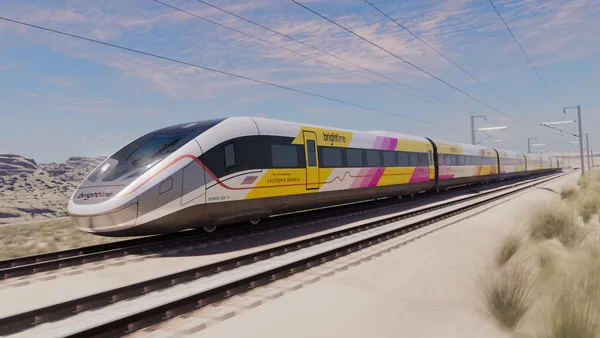Dive Brief:
- Lyft recently announced that it deployed 200 long-range electric vehicles (EVs) into its Express Drive program in Denver. The Express Drive program operates in nearly three dozen U.S. cities and allows drivers to rent vehicles through Lyft's partners instead of committing to longer-term options such as leasing or buying their own.
- The EVs will be available in December and will constitute the largest EV deployment in Colorado's history, and one of the largest in the country, a Lyft spokesperson told Smart Cities Dive.
- The effort is part of Lyft's larger plan for a fully electrified fleet on its platform. Lyft would not say how many EVs are available nationwide through the program or the size of the entire rental fleet, but in a blog post from February the company wrote that it anticipates introducing "thousands" of EVs on the platform this year.
Dive Insight:
Forward-thinking EV adoption policies by state and local governments in Colorado helped to make the deployment feasible in Denver, according to a Lyft blog post. A key action has been improvements to EV incentive programs. Lyft expressed a desire to grow its electrification efforts beyond Colorado, but it challenged partners including policymakers, regulators, utilities, nonprofits and auto manufacturers to help it get there.
Earlier this year, Lyft launched "Green Mode" to let passengers request an EV or hybrid vehicle through the Express Drive program. Seattle and Atlanta were the first two cities where EVs were introduced. Last year, Lyft declared that it was carbon neutral, in large part due to its purchase of carbon offsets.
Other services likewise are trying to make their vehicle fleets greener. Uber recently partnered with EVgo to research ways to accelerate the use of EVs on its platform. And a taxi company in Madison, WI will launch an all-electric fleet; it is among the many cab companies across the country increasing their use of EVs.
Denver is on the leading edge of U.S. cities' efforts to cut carbon emissions. While the the EV deployment in Denver is a private company's doing, it still contributes to the city's sustainability goals. Plus, Lyft indicates governmental actions contributed to the move.
Denver has also worked to cut carbon emissions through a variety of other initiatives. It was named one of the winners of Bloomberg Philanthropies' American Cities Climate Challenge and committed to using the resources it was awarded to transform its EV market through public education and test drives as well as incentives to encourage the build-out of charging infrastructure.
It is also one of the five cities partnering with the National Association of City Transportation Officials (NACTO) to design and implement bike and transit projects by the end of next year to cut emissions. The city's 80 x 50 Climate Action Plan aims to reduce greenhouse gas emissions by 80% — compared to the levels in 2005 — by 2050, in part by encouraging drivers to convert to EVs.











